Six Miles to Charleston (5 page)
Read Six Miles to Charleston Online
Authors: Bruce Orr
Armed under the pretext of Lynch's Law, the mob had ridden out from Charleston first to the Five Mile House and, after administering their own brand of justice, they then proceeded to the Six Mile House to do the same. They had no legal authority and were not represented by such in any way. Documentation also shows that not one of the robbery victims could identify any of their assailants. Regardless of these facts, the lynch mob returned to Charleston with the feeling they had successfully and completely driven out and disbanded the occupants of both inns. An account of their actions was reported in the
Charleston Courier
on Saturday, February 20, 1819.
C
HAPTER
2
The Victims
T
WO
C
ORPSES AND A
C
OW
Sometime after the lynch mob returned to Charleston, the occupants that had been driven out of the Six Mile House returned to the inn. An altercation occurred with David Ross as he stood guard over the Six Mile House. He was attacked but managed to escape into the woods and make his way back to town. His sworn affidavit, given to the authorities on February 20, 1819, described what transpired according to Ross.
David Ross being duly sworn deposeth that on yesterday about the hour of nine, William Hayward came to Six Mile House of which he was in possession, accompanied by another person, whose name is unknown by him, that the said Hayward cursed him, collared him violently, and pushed him out of doors. The deponent then again reentered the house, and asked to take away the few articles that belonged to him; Hayward put his hand into his bosom, and said you damned infernal rascal, if you lay your hand on anything, I will blow your brains out.âBy this time Fisher and his wife Lavinia Fisher came up, with two other men, whose names are unknown to himâthat Lavinia Fisher laid violent hands upon him, choaked
[sic]
and boxed his head through a pain
[sic]
of window glassâwhilst I was endeavoring to get away from them, Hayward and Fisher beat him unmercifully, with loaded whips aided and assisted by the other two men, whose names are unknown to him, there was also another woman, who aided and assisted, whilst they were beating him, the deponent leapt out of the piazza, and crossed the road through the woods then he got to the Four Mile House, but just as he had entered the woods, they fired at him, he got at least into the main road and on his way to town, near Freightous Bridge, he saw the whole party coming to town, Fisher exclaimed several times, you damned infernal rascal if ever I catch you, I will give you a hundred lashes.
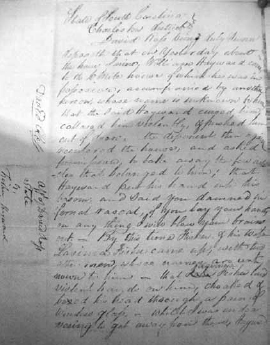
First page of David Ross's statement.
Courtesy South Carolina Department of Archives and History.
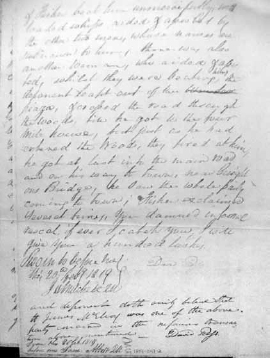
Second page of David Ross's statement.
Courtesy South Carolina Department of Archives and History.
As an amendment, the following appears to have been added after the judge's signature: “and deponent doth believe that James McElroy was one of the above party concerned in the nefarious transactions above mentioned.”
As David Ross was making his way back to town after the alleged attack, a trader named John Peoples was making his way out of town. Two hours after Ross was attacked, Peoples stopped at the Six Mile House to water his horses. As he and a young boy that was with him watered the horses, he was allegedly attacked and robbed. The following is the affidavit that Peoples provided to the authorities upon his return to Charleston.
John Peeples being duly sworn deposeth that on yesterday forenoon, the 19th into about eleven o'clock as he was returning home from town to his residence in the country he stopped near the forks of the road about 6 miles from town to water his horse that whilst his horses were watering a man came out of the 6 Mile House and told a boy who was with him that he must give him his bucket as he wanted to water his horse, the boy refused to give him the bucket saying he wanted it himself, he swore he would have it and immediately nine or ten persons, among them a tall, stout woman, came out of the same house to the place where he was armed with clubs, guns, and pistols, and immediately made a violent assault on him, some of them beating him with sticks and with their guns, and several times they flashed their pistols at him, that the woman appeared to be the most active in beating him, cutting him over the head and eyes with a stickâthat after a while they left him, and reentered the same house, and the deponent proceeded about two hundred yards on the road when two of the same men came up to him on horseback, and stopped his waggon
[sic]
âand said to him that they would kill him, both of them presenting pistols to him and snapped them at him and demanded of him his money, they then searched his pocket, and took out his pocketbook, which contained his money amounting to between thirty five and forty dollars and then rode back towards the house from whence they came, the Six Mile Houseâthe deponent then came back to Charlestonâthe deponent doth not know the names of those persons who hath so cruelly beat him and robbed him but that he hath just cause to believe that among them was William Hayward, John Fisher and his wife Lavinia Fisher, Joseph Roberts and John Andrews.
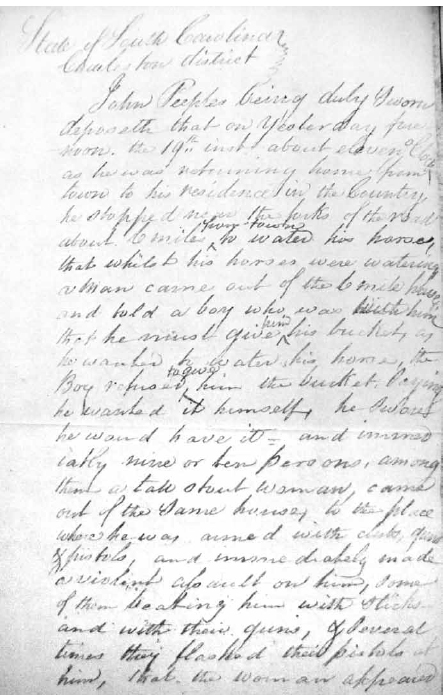
First page of John Peoples's statement.
Courtesy South Carolina Department of Archives and History.
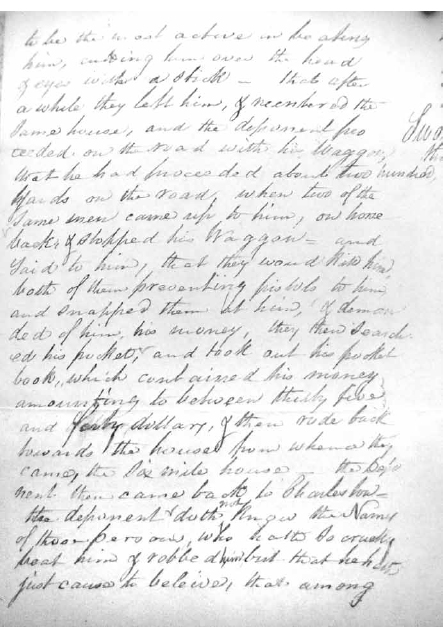
Second page of John Peoples's statement.
Courtesy South Carolina Department of Archives and History.
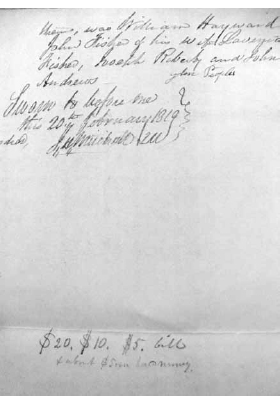
Third page of John Peoples's statement.
Courtesy South Carolina Department of Archives and History.
Some interesting things to note about Peoples's affidavit are that it is written in several different forms of handwriting and his name is spelled both as “Peeples” and “Peoples.” It is signed “John Peoples.” Included on the affidavit is a list:
6 Mile Housemen
John Fisher
Lavinia Fisher
Wm. Hayward
Joseph Roberts
Wm. Andrews
Seth Young
James McElroy
John Smith
F. Davis
James Sterrett
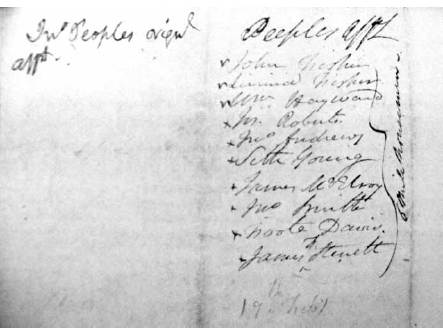
Side note on Peoples's statement listing Six Mile Housemen.
Courtesy South Carolina Department of Archives and History.
Davis's first name is unreadable, and his arrest is undocumented. It appears that these names were added to the affidavit much as James McElroy's name had been added to Ross's affidavit. Both affidavits were sworn out at the same time by the same judge. Since the signature is different in spelling than the actual affidavit and the handwriting is different, it is obvious this statement was written for John Peoples. It is also in the same handwriting as David Ross's affidavit.
With two victims, the sheriff was now moved into action where he had failed to take action before. With a fairly large “Party of gentlemen,” as the
Charleston Courier
would later report, the sheriff, Colonel Nathaniel Greene Cleary, set out to the Six Mile House. Upon surrounding the house, the occupants surrendered without a fight and were taken into custody, even though they had been armed with ten to twelve muskets and a keg of powder. Many accounts state John Fisher opted to surrender rather than risk injury or death to his wife, Lavinia. That is one account. Another version is apparently the large group surrounding the house put a quick end to any thoughts of resistance. Regardless of the reasoning for lack of resistance, John and Lavinia Fisher, James McElroy, Seth Young and Jane Howard were taken into custody, loaded into the paddy wagon and taken to the City Jail on Magazine Street. While searching the property, the sheriff's group located the hide of a cow that had been killed recently. The hide had been hidden inside an outhouse. It was indeed identified as a cow belonging to Stephen LaCoste, one of Charleston's citizens. He had been correct in his belief that it had met with a very unpleasant fate.
The sheriff's group then set fire to the Six Mile House, and it was burned to the ground, including all outbuildings. No one was allowed to remove anything. Absolutely everything was burned, just as the Five Mile House had been burned the night before.
Located behind the Old City Jail on Magazine Street is a very large iron paddy wagon that had been used in Charleston since the 1700s. This wagon would have been used to bring the prisoners to the jail. The enormous weight of the paddy wagon required at least eight large draft horses to pull it. The open cage allowed spectators to throw rotted fruit and garbage at the accused as they were taken to jail. The six-mile ride back to Charleston in the cold February air had to be bad. Add in the fact that it was inside a castiron cage on dirt and cobblestone roadsâit had to make the trip grueling. It apparently was the beginning of a very harsh existence for the Fishers inside the city jail.